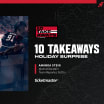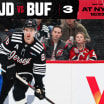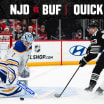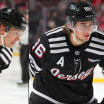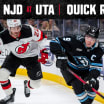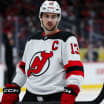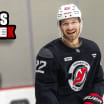After being a point-per-game player in the QMJHL and having an extended look in training camp for his speed and strength, Brandon Gignac was ready to take on his first professional season last fall after being assigned to the Binghamton Devils. In his first two months, he managed just two goals and an assist, but showed a strong two-way game as he grew more confident in his abilities at the AHL level.
Gignac aims to impress at Devils Training Camp
Gignac looks to build off experience with the Binghamton Devils when 2018 Training Camp opens
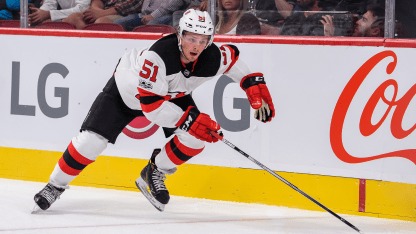
By
Julie Robenhymer @JulieRobenhymer / newjerseydevils.com
That progress came to a screeching halt on December 13th when he suffered a significant knee injury.
"I got the puck on the board and tried to go wide on the defenseman and all of my body got through except for my right leg, which got squeezed along the boards with his hip," the 20-year-old from Quebec explained. "I tore my ACL and my MCL, so it was a pretty bad injury."
Gignac's MCL healed on its own, but his ACL required surgery to take part of his hamstring to reinforce the ligament. Expected recovery was six months.
"Going through all of that was no fun," he said. "I didn't like that I couldn't play hockey or couldn't be around my teammates all the time and, for awhile, I couldn't do much of anything. No. That was not fun at all. I don't suggest anybody do that."
While recovering at home near Montreal and going to physical therapy three times a week, he kept tabs on his teammates in Binghamton. Sometimes, he'd even make the five hour drive just to say hi.
"I wanted them to know that I was thinking about them even more than a text or two could say," Gignac explained. "I care a lot about my team and my teammates and I didn't want them to think I wasn't paying attention just because I wasn't there. I tried to be around them as much as I could. Selfishly, I was also excited just to see some hockey because I missed it so much."
Five months after his surgery, the 5-foot11, 170 pound forward selected by the Devils in the third round in 2016 was cleared to skate again.
"The day before, I was so anxious. I couldn't sleep and I just wanted to get on the ice and have everything go well," he said. "My parents and my girlfriend went with me to make sure I was ok. I thought I'd need a chair to help me get around, but my knee was way better than I thought and once I felt comfortable that my knee would support me, I started pushing it a little more and went faster and faster, started playing with the puck and taking shots.
"It was crazy," Gignac continued wearing a smile he couldn't shake. "It was honestly one of the best feelings of my life."
A month later, just before the start of development camp, Gignac was skating at full speed without any hesitation. While he participated in all physical testing and practices during the camp in July, he didn't play in the three-on-three tournament or the red and white scrimmage for precautionary reasons.
"If it were up to me, I would have played," he said with a confident grin. "The doctors checked it out and said my knee was perfect, and management had me on a schedule of skating during camp and participating. We all wanted to make sure I could be healthy the rest of the summer and work on getting stronger so I could be 100% ready to go in September."
Although recovering from an injury like this was difficult, he used it as an opportunity to focus on other areas that would help him improve his game - his upper body strength and his mental attitude.
"I contacted a sports psychologist while I was recovering to help me not have any fear," he explained. "I knew my knee had no pain, so I couldn't understand why I was having stress and being nervous about it. The psychologist helped me a lot with the process and taught me to relax a little bit more and not have that fear. Really, I think I just need to play a game and get hit and after I survive that first hit, I'll be like, 'Ok, I'm good. I don't need to be worried, so let's go.'"
Since he was unable to do anything in the gym to improve or even maintain his lower body strength, he focused solely on upper body workouts the first three months of his recovery.
"I could do the bike and some cardio stuff, but no squats or anything with weights," Gignac said. "So I was able to just do upper body, which was one of my weaknesses. I definitely take that as a positive side effect of this injury because I did better in the upper body testing than I ever have at development camp. That was really great to see. I was proud of my work."
As rookie camp draws closer, Gignac has been focused on the details that will help him make a big impression as he looks to move on to main camp and fight for a roster spot.
"I want to keep running because I haven't had the chance to run a lot and my running test wasn't the best," he explained. "My right quad also isn't as strong as my left, so I want to work to balance that out too. Then I want to work on everything else so I can be a stronger, better, faster hockey player than I was last year. It's all the little details that will add up and help me to have a great camp in September.
"They told us at the start of development camp that they were looking for two guys in that room to make the team this year, so I say to myself, 'Why not me? I know I'm able to do it. I know I fit into what the organization is looking for. So I just want to prove to them that I've worked hard to earn the opportunity to make the team and will give them everything I have.
He stopped and smiled before continuing: "I am so excited for camp this year. You have no idea. I can't wait for September."

